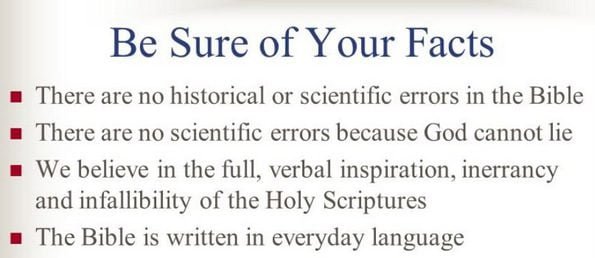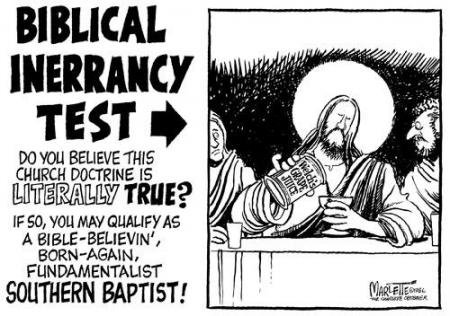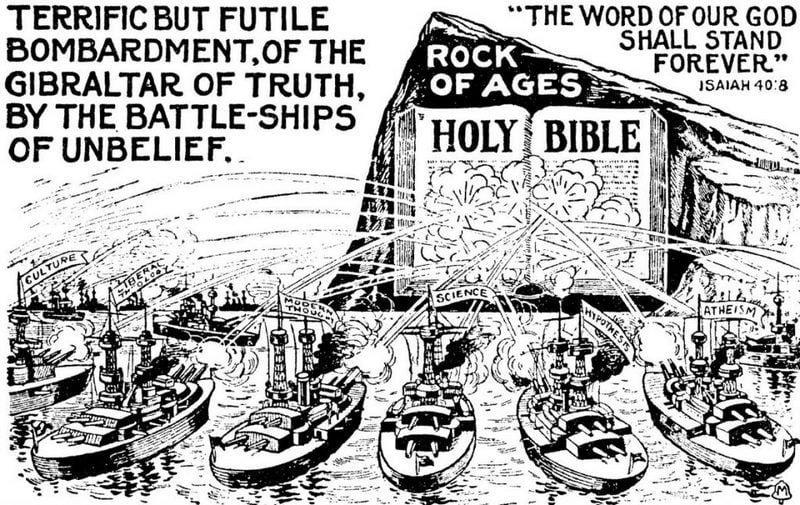
“I believe the Bible is the Word of God,” millions of Evangelicals say. “I believe the Bible is inerrant and infallible. I believe every word in the Bible is true. Whatever the Bible says, no matter how silly or irrational, I believe it is true. When worldly human knowledge contradicts the Bible, I am going to believe the Bible every time. When science contradicts the Bible, I am going to believe the Bible. When history, archeology, cosmology, biology, physics, chemistry, botany, zoology, medicine, psychiatry, psychology, astronomy, and genetics contradict the Bible, I am doing to believe the Bible.”
According to one Evangelical who has no formal science training:
The unbelieving world is famous for demanding physical evidence for biblical content. They refuse to believe because of the ‘God did it’ factor or for other reasons. This is done regardless of the fact that there are scores of physical evidence from various scientific and other sources proving the validity of the biblical content.
….
We demand that the unbeliever produce verifiable and real physical evidence for each stage of their Big Bang Theory. If they can’t provide any or just offer excuses, then they need to be silent on the universe’s origins.
They cannot prove their theory so it is not true and not a viable option to the creation account. The existence of stars, planets, comets, etc., does not provide any evidence for the alleged processes unbelievers claim took place.
The existence of the universe and its contents does not exclude the biblical account of creation nor any other alternative to it.
….
The unbeliever needs to provide verifiable, real physical evidence proving the source of gravity as well as the development of this field.
With the Bible, we have the answers to these questions– God and his power. Yes, God did it and science cannot produce any physical evidence for any of the alternative theories it proposes.
….
All science can do is offer an alternative explanation for what they observe in the present. When science and scientists omit God, then they have no possible avenue to produce one shred of evidence to support their theories.
The so-called evidence they claim that proves their theories correct is not real evidence. Scientists have no hope of proving those alleged items are real evidence because they do not know if they played a role in the origin of the universe or life or not.
They are merely guessing and have no clue how the universe came to be. So-called background radiation is not evidence for anything except for the presence of background radiation.
Looking at something in the present means one has to guess at how it came to be if they have no written information proving it is evidence for origins. The only document that has written evidence for our origins is the Bible.
When scientists toss that then they are left with nothing. Nothing they claim in their theories leads them closer to the truth. The reason this is so is because they cannot produce one shred of physical evidence for every step of the Big Bang or life’s formation, etc.
Yes, they can say they have evidence, but upon closer scrutiny, their claims remain unproven and simple guesswork.
….
How do they know it was an ‘explosion’ and not God’s power that did it? They need to provide real verifiable physical evidence to prove it was an ‘explosion’ and not a supernatural act.
….
Where is the real verifiable physical evidence for this event? Saying it took place or saying ‘I believe…’ or ‘we believe…’ is not physical evidence. That is just propaganda.
There is just so much in the Big Bang Theory that lacks any supporting physical evidence. Under the unbelievers’ rules, it did not happen unless they can produce the real, verifiable physical evidence to prove that it did.
Everything that science says about origins must be taken by faith, something the unbeliever finds anathema to do when it comes to God and the Bible. Yet, we have more real verifiable physical evidence for God and the Bible than all the scientists in the world have for their origin theories.
….
No matter what scientists do, they cannot compete with or disprove the Bible or God.
This particular unaccredited Bible college-trained preacher’s beliefs are typical among Evangelical pastors, though better educated men and women know that the claims they make for the Bible are not true; that although the Bible might be faithful and reliable and sufficient, it is not inerrant, nor is it infallible. Inerrancy and infallibility cannot be rationally sustained, as any of Dr. Bart Ehrman’s books make clear. Countless books have been written by scholars to disabuse Evangelicals of the notion that the Bible is some sort of supernatural book written by a supernatural God, without error. Some Evangelicals, knowing their position on the Bible is absurd, appeal to inerrant originals. No, the English Bible is not inerrant, but the manuscripts from which the Bible was translated were, pious preachers say. Of course, said inerrant originals do not exist, so we have to take their word for it. Other Evangelical preachers go to the other extreme, saying that a particular translation of the English Bible — the King James Version (KJV) — is inerrant and infallible. Some even believe that the italicized helper words added by translators to aid with reading, and for which there is no correlation in the Greek and Hebrew manuscripts, are inspired by God and without error. The aforementioned preacher believes the KJV, NKJV, NASB, and NIV are all inerrant and infallible, even though they differ in thousands of places.
Bruce, surely it shouldn’t be hard to convince Evangelicals that the Bible is not inerrant or infallible. Just show them evidence that contradicts their beliefs or get them to read a couple of books. Isn’t this enough to persuade them that their beliefs are false? I wish it were that simple, but since these sincere followers of Jesus weren’t argued into their beliefs, they won’t be argued out of them. Years of deep indoctrination and conditioning have made them impervious to evidence and facts (and the same can be said for all of us when it comes to beliefs we hold dear). That’s why I don’t argue with Evangelicals about Bible inerrancy and infallibility. I write articles challenging these beliefs, hoping that something I say might cause a chink in their Bible armor or I recommend books I hope will disabuse them of their irrational beliefs. I know, however, that until Evangelicals, at the very least, ponder that they could be wrong, they are unreachable. Certainty breeds arrogance, and arrogance precludes someone from gaining a better understanding of his or her beliefs. Humility leads us to consider that we could be wrong or that our beliefs are lacking or that our teachers, well-intentioned or not, might have been lacking in their own knowledge about the Bible. As long as “the Bible says” (or better put, “as I interpret the Bible”) is the final answer to every question, Evangelicals will continue to ignorantly believe sixty-six books of the Protestant Bible are without error and infallible in ALL that it teaches and says.
Suppose the Bible said 1+1=5. Mathematics tells us this is false; that 1+1=2. If the Bible is inerrant and infallible, the Evangelical is forced to say, with shouts of praise to the one true God, 1+1=5. Absurd? Sure, but no more so than believing that the universe is 6, 027 years old; that the earth was created in six twenty-four days; that snakes walked on two legs and spoke a language understood by humans, and that a donkey talked in the same voice with a man; that the entire earth was covered in flood water 4,000 or so years ago; that millions of Israelites spend forty years walking the 432 miles between Egypt and Canaan — a trip that should have taken roughly three weeks; that demonic angels of large size had sex with human women, leading to the birth of part angel, part human children; that the earth stopped its rotation for twenty-four hours … shall I go on?
If you believe that the Bible is inerrant and infallible, you must believe that all the above things are true. No evidence will be forthcoming outside of proof texts from the Bible. So if the Bible said 1+1=5, Evangelicals have no choice but to accept that what “God” said is true; that no matter what mathematicians say, they are wrong, and the Word of God is right.
Bruce, this is insane. Yep, but I believed this way for most of my life, as did many of the readers of this blog. The only hope I see for 1+1=5 believers is this: when they balance their checkbook and add up 1+1, do they write down a 5? Nope. They know empirically that 1+1=2. Believing otherwise would cause all sorts of problems in their lives. Suppose an Evangelical homeschooling family has a daughter who wants to be an engineer and a son who wants to be a physician. Their math instruction teaches them, as billions and billions of people know to be true, that 1+1=2. Should their parents teach them, instead, that 1+1=5; that what the Bible says is right and their math book is wrong? Of course not. The parents KNOW that 1+1=2 and that teaching their children otherwise would be disastrous for them when they go to college to train to be an engineer and a doctor. They would flunk out of college in their first semester, mocked and ridiculed for stupidly believing 1+1=5.
Thus, the homeschooling Evangelical parents live with cognitive dissonance — the mental discomfort that results from holding two conflicting beliefs, values, or attitudes. There’s no way to square 1+1=5 with 1+1=2, so the parents are forced to have one set of beliefs at church and another at home. They are forced to affirm beliefs that they KNOW in the depths of their minds cannot be reconciled. And it is this cognitive dissonance that provides a path by which Evangelicals can be reached. Doubts, questions, and irreconcilable beliefs can and do lead to reconstruction — the rethinking and reevaluation of beliefs and practices. While this process does not necessarily or even usually lead to atheism or agnosticism, it can and does lead people to expressions of faith that put knowledge, facts, and evidence above the words of 2,000-4,000-year-old pre-science authors who had little to no understanding of how the world really works. They were products of their time, so I don’t fault them for what they wrote, but here we are in 2024 and we have millions and millions of Americans who still think the year is 4,000 BCE.
1+1=2, and no matter how many words will be expended saying that what I wrote in this post is wrong, the fact remains that the Bible is not inerrant or infallible. Whatever one might, by faith, believe the Bible is, all the extant evidence tells us that it is a manmade book, littered with errors, contradictions, and mistakes. Evangelicals are free to ‘splain away these inconvenient truths any way they can, but the fact remains that all a critic needs to show is one error, contradiction, or mistake in the Bible to bring inerrancy crashing to the ground.
Bruce Gerencser, 68, lives in rural Northwest Ohio with his wife of 47 years. He and his wife have six grown children and sixteen grandchildren. Bruce pastored Evangelical churches for twenty-five years in Ohio, Texas, and Michigan. Bruce left the ministry in 2005, and in 2008 he left Christianity. Bruce is now a humanist and an atheist.
Your comments are welcome and appreciated. All first-time comments are moderated. Please read the commenting rules before commenting.
You can email Bruce via the Contact Form.




